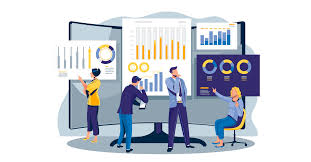Collaborative Business Intelligence: Connecting Data and Teams
In today’s data-driven world, the ability to interact with business intelligence (BI) tools is essential for making informed decisions. Collaborative business intelligence (BI), also known as social BI, allows users to engage with their organization’s data and communicate with data experts through the same platforms where they already collaborate.
While self-service BI empowers users to generate insights, understanding the data’s context is critical to avoid misunderstandings that can derail decision-making. Collaborative BI integrates BI tools with collaboration platforms to bridge the gap between data analysis and communication, reducing the risks of misinterpretation.
Traditional Business Intelligence
Traditional BI involves the use of technology to analyze data and present insights clearly. Before BI platforms became widespread, data scientists and statisticians handled data analysis, making it challenging for non-technical professionals to digest the insights. BI evolved to automate visualizations, such as charts and dashboards, making data more accessible to business users.
Previously, BI reports were typically available only to high-level executives. However, modern self-service BI tools democratize access, enabling more users—regardless of technical expertise—to create reports and visualize data, fostering better decision-making across the organization.
The Emergence of Collaborative BI
Collaborative BI is a growing trend, combining BI applications with collaboration tools. This approach allows users to work together synchronously or asynchronously within a shared platform, making it easier to discuss data reports in real time or leave comments for others to review. Whether it’s through Slack, Microsoft Teams, or social media apps, users can receive and discuss BI insights within their usual communication channels.
This seamless integration of BI and collaboration tools offers a competitive edge, simplifying the process of sharing knowledge and clarifying data without switching between applications.
Key Benefits of Collaborative Business Intelligence
- Improved Decision-Making Collaborative BI enables employees to leverage multiple data sources and generate reports that are easy to interpret. Integrated communication features allow users to share insights instantly, helping teams make faster and more confident decisions. By breaking down silos, data flows more freely across departments, ensuring everyone operates from the same foundation of knowledge.
- Empowering Employees with Data Self-service capabilities in collaborative BI platforms foster a data-centric culture. Employees can generate their own reports, manipulate data, and ask questions, leading to greater autonomy and better alignment with organizational goals. A survey from ThoughtSpot and Harvard Business Review found that 72% of leaders reported increased productivity, 67% improved product quality, and 69% greater employee engagement through data empowerment.
- Optimizing Data Quality and Efficiency Collaborative BI centralizes data within a shared platform, ensuring clean and organized data management. With real-time updates and consistent data inputs, users avoid redundancies and benefit from better data accuracy. Centralized BI tools keep workflows efficient and make searching for past reports or conversations about data simple.
- Enhancing Data Security A centralized repository for collaborative BI ensures easier data governance and security. Connecting BI tools to all data sources helps track data origins and mitigate risks. Organizations can create permissions to control access to sensitive information, ensuring that only authorized users can share or discuss specific data sets.
Leading Collaborative BI Platforms
Here’s a look at some of the top collaborative BI platforms driving innovation in the market:
- IBM Cognos Analytics: Compatible with multiple data sources, including SQL databases and Google BigQuery, IBM Cognos allows users to drag and drop data for visualization. With collaboration features like Slack integration and a mobile app, users can share insights on the go.
- Power BI: Microsoft’s Power BI integrates with Azure, Microsoft 365, and communication tools like Teams and Outlook. Its interoperability enables users to seamlessly pull BI insights into their familiar apps, making it easy to share reports without exporting data.
- Qlik Analytics: Known for its user-friendly interface, Qlik Analytics is accessible to users of all skill levels. Its intelligent alerts, social media compatibility, and seamless sharing features enable quick collaboration with team members and external stakeholders.
- Tableau: Salesforce’s Tableau includes robust in-app collaboration, such as tagging and commenting, and is accessible via desktop or mobile. These features allow users to share and discuss dashboards with context, enhancing cross-functional collaboration.
- Yellowfin: Yellowfin offers export, email, or link sharing for reports and dashboards. Its “Timeline” feature functions like a social media feed, allowing users to follow and interact with BI content in real time.
Conclusion
Collaborative BI empowers organizations by improving decision-making, democratizing data access, optimizing data quality, and ensuring data security. By integrating BI tools with collaboration platforms, businesses can streamline their operations, foster a culture of data-driven decision-making, and enhance overall efficiency. Choosing the right platform is key to maximizing the benefits of collaborative BI.













